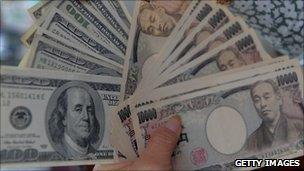Viewpoint: Yen is heading for a currency collapse
- Published

The yen has risen by almost 10% against the US dollar in the past 12 months.
The Japanese yen is now being chosen as a safe haven. But the currency is about as safe as standing under a cliff in the way of a landslide in the pouring rain.
Japan is on the verge of a financial collapse, which is far more dire than the budget deficit problems in Europe or the US.
The accumulated debt of Japan is now at 924tn yen ($11.3tn; £7tn). Even if 10tn yen is repaid every year, it will still take 92 years to pay off the debt.
Ideally the government would be limiting its spending in an effort to cut its debts.
But that is not going to happen, especially given the devastation caused by the 11 March earthquake and tsunami and expenditure is about to balloon once again.
The government says its intends to spend as much as 92tn yen this year, with a large chunk of that going on rebuilding.
If it keeps this level of spending going, then there is no way it will pay off the national debt even in 200 or 300 years.
Financing problems
The only way to get out of this situation is to cause hyperinflation, a rate of inflation so fast that the value of the national currency and assets nosedives.
That will see prices in Japan rise rapidly, helping the government collect more taxes and thus make it easier to pay down the country's debt.
However, that means the value of yen will be far lower than the current level.
More worrying, however, is the fact that it will only take a slight increase in interest rates for the government's finances to blow up.
I expect an incomplete auction of government bonds, when investors decide not to buy what is being offered, to occur in the near future, and this will be the beginning of an era of hyperinflation.
Should an incomplete auction happen, then stock, bond and currency markets will all plunge.
This is going to be the X-day. This is going to be the landslide off the cliff in the rain.
Market circuit breakers will be triggered, which will keep stock and bond futures markets closed for an extended period of time.
In order to deal with this, the Bank of Japan (BOJ) will have to:
Underwrite Japanese Government Bonds (JGBs), which is prohibited under the current laws
Desperately buy the JGBs from private financial institutions to put an end to runs on banks
Aggressively print more money, in the hope that bundles of yen notes on the teller window will provide reassurance to depositors.
Another way down?
It is also possible to see a dramatic decline in the yen even without going through the process of an incomplete auction.
The Japanese currency dips whenever the view of Japan's international standing and global power is perceived to be at rock bottom.
Japanese taxpayers are beginning to feel that way now, and there is a move to transfer the 1,490tn yen of household financial assets from within the country and use them to buy foreign currency assets.
Individual investors have so far invested no more than 2-3% of the 1,490tn yen in foreign currency assets. That is in the process of changing.
When they start to move their money from yen assets to foreign currency assets out of fear, there could be waves of yen depreciations, as just 1% of 1,490tn yen is worth more than Japan's total annual account surplus.
Even a slight drop in the yen will prompt more people to rush to sell it, and this will eventually grow into the gigantic waves of a complete currency collapse.
Takeshi Fujimaki is the chief executive of Fujimaki Japan Ltd, an investment advisory company based in Tokyo.
The opinions expressed are those of the author and are not held by the BBC unless specifically stated. The material is for general information only and does not constitute investment, tax, legal or other form of advice. You should not rely on this information to make (or refrain from making) any decisions. Links to external sites are for information only and do not constitute endorsement. Always obtain independent, professional advice for your own particular situation.
- Published4 August 2011
- Published18 March 2011